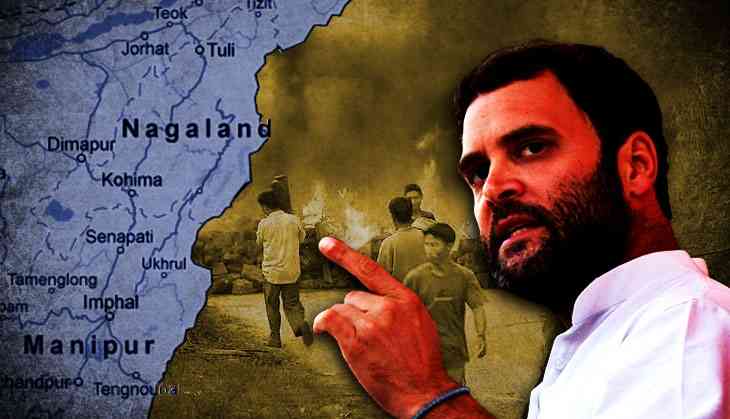Manipur polls: Has Ibobi Singh wrecked the BJP's march to victory?

With only three days left before the first phase of polling begins in Manipur, the Congress is hoping to make electoral gains by exploiting the fear among the dominant Meiteis of the plains that the 2015 Naga Peace Accord between the central government and the National Socialist Council of Nagaland (Isak-Muivah) could threaten the territorial integrity of the state.
The strategy seem to be working for the grand old party, which has been on the back foot ever since it lost Assam and Arunachal Pradesh to a resurgent BJP. Reports suggest the Meiteis, who constitute more than 60% of the state's population, are likely to support the Congress in the upcoming election and this has unnerved the the saffron party.
Also Read: Smoke signals: how to read the BJP win in Manipur. And why it matters
Sensing that the mood is swinging in its favour, the Congress on Tuesday fielded party vice president Rahul Gandhi in its campaign. He attacked Prime Minister Narendra Modi for not talking to the people of Manipur before signing the accord. The Gandhi scion, addressing a large gathering in Imphal, said that even Chief Minister Okram Ibobi Singh wasn't consulted and that no one knows what is in the accord.
“PM Modi didn't even speak to Okram Ibobi. No minister knows about the contents of Naga accord. Till date no one knows what is there and not there in this prepaid Naga accord. It's all in his head. Ask Modiji why Manipur wasn't consulted before signing the accord?” Rahul demanded that the contents of the accord signed by Modi should be made public.
The BJP strategists too feel that the discontent over the Naga accord has put the party on the back foot, but they blame the chief minister for creating this division among the people.
It was for this reason that Modi, in his first campaign rally in the state, tried to assure the people that they had little to fear from the accord. “There is not a word in that agreement that can be considered as harmful to Manipuri interests,” Modi said. Attacking the Ibobi Singh government, the prime minister accused the Congress of misleading the people about the accord.
“There is nothing in the agreement that can harm and hurt Manipur's territorial integrity. The chief minister is dividing the people to remain in power. He does not have the right to continue in his chair,” Modi said.
Without naming him, the prime minister targetted Ibobi Singh for raising the issue right before the election. “Were you sleeping for the past one and a half years?” he asked.
Ibobi was quick to respond, saying if there was nothing in the accord that would infringe upon Manipur's rights then why were its contents being kept secret. He added that the people of Manipur can't rely on the prime minister's verbal assurance about protecting the territorial integrity of the state.
Also Read: Manipur now has a bill to regulate migrants. Why is it still burning?
Almost six months before the election, ground reports suggested a rise in the BJP's popularity among the Hindu Meiteis. Anti-incumbency, combined with charges of corruption and nepotism against the ruling party, gave the BJP hope of making in-roads in yet another Congress bastion in the Northeast.
This unsettled the Congress and Ibobi. It was then that the wily 68-year-old three-time chief minister played a masterstroke. He announced the creation of seven new districts by splitting up Naga-dominated districts, leading to an agitation by the Naga community, which saw the proposal as an attempt to compromise the territorial integrity of Naga-inhabited lands. Ibobi was also able to appease the Kuki tribe by creating Sadar Hills district.
The move left only the Nagas unhappy with the decision, while all other communities beginning to side with the Congress government despite the anti-incumbency at play.
Immediately after the decision to create new districts was announced, the Naga-backed groups claimed that they were not consulted and imposed an economic blockade on National Highways 2 and 37, which are crucial for supplying the Imphal valley. Life was thrown out of gear, with prices of essential commodities sky rocketing. This further antagonised the Meiteis, who accused the Nagas of disrupting normalcy.
Ibobi and the Congress used this schism to their advantage. Manipur was already a divided society, with the tribes inhabiting the hills, particularly the Nagas, arrayed against those residing in the Meities of the plains. But the Congress used the agitation to deepen the divide, not least by blaming the BJP for joining hands with the Nagas and NSCN(IM) against Manipur.
This ploy changed the political narrative and, suddenly, the Congress, which had been all but ruled out of making a comeback, was back in the game. The BJP, on the other hand, found itself in a catch-22 situation – it could not criticise the creation of new districts for fear of alienating the Meiteis; it could not take a critical stand on the economic blockade lest it jeopardise the Naga peace process.
It was only left with corruption and anti-incumbency as poll issues, which were no longer relevant. No wonder, BJP president Amit Shah, who was in Manipur Tuesday, attacked Ibobi over corruption charges but, just like Modi, said nothing about the creation of new districts – a move that is likely to halt the saffron party's march in this Northeastern state.
Also Read: "I killed in cold blood": what the Manipur cop's confession says about political impunity


